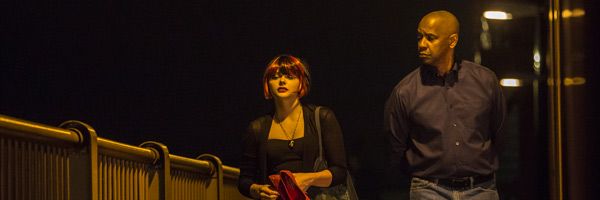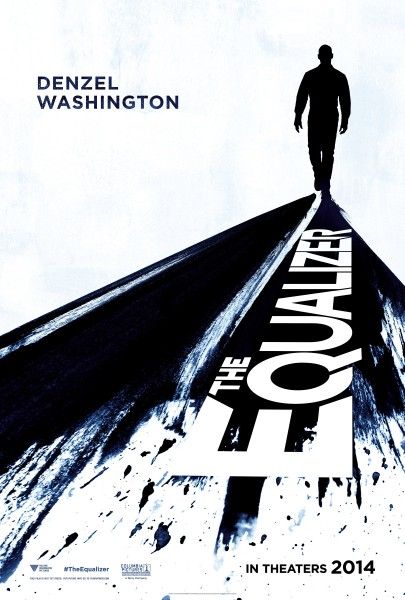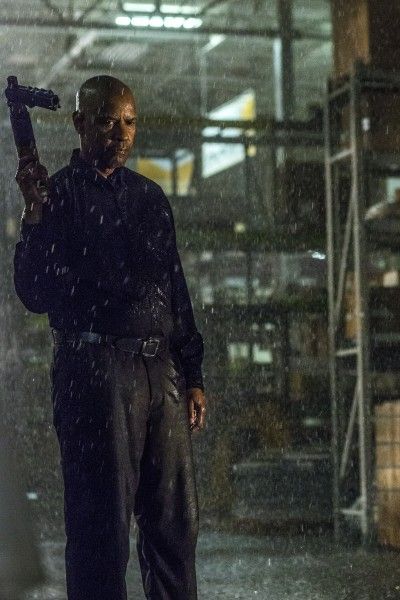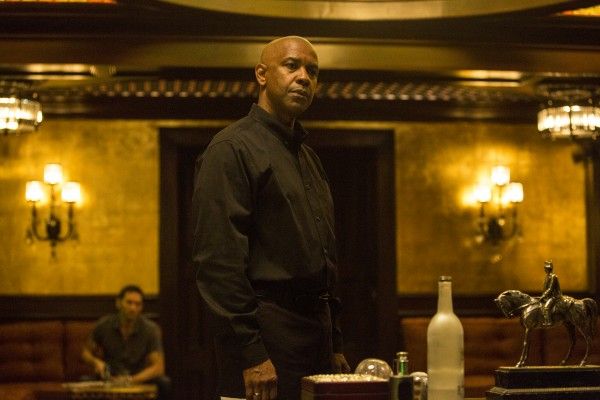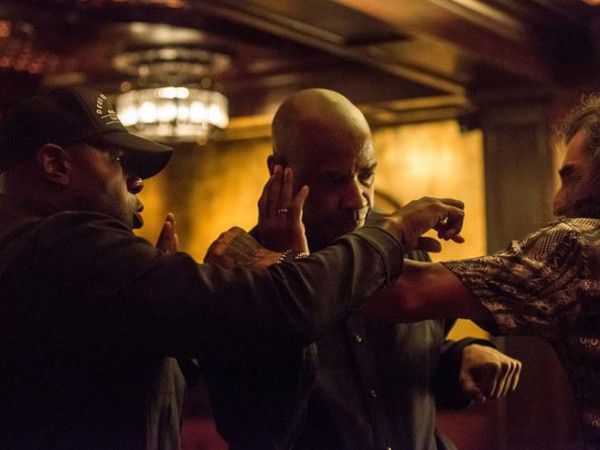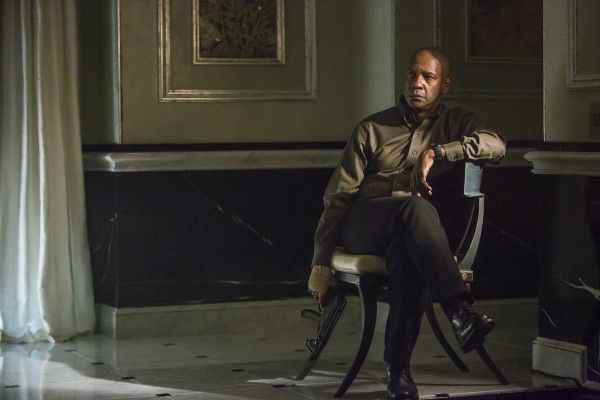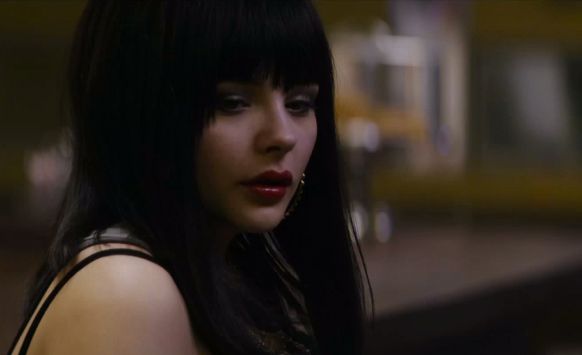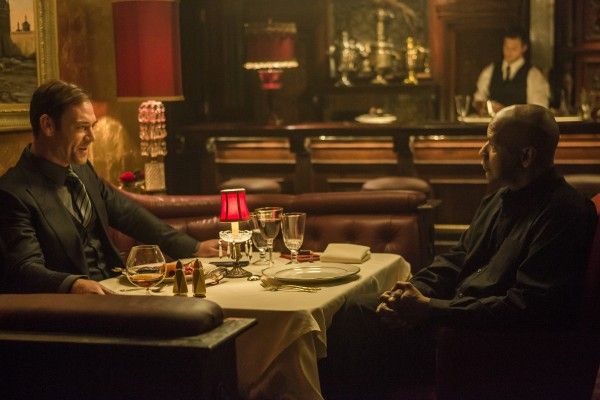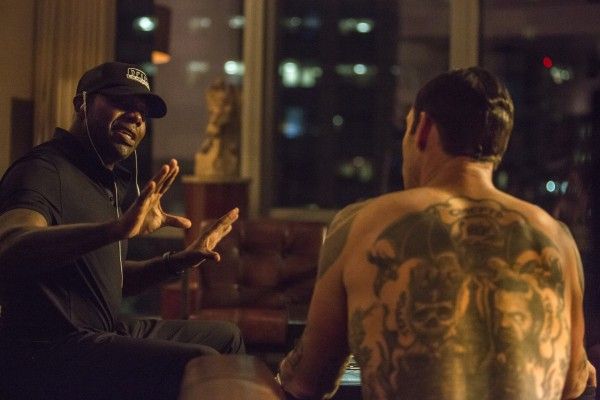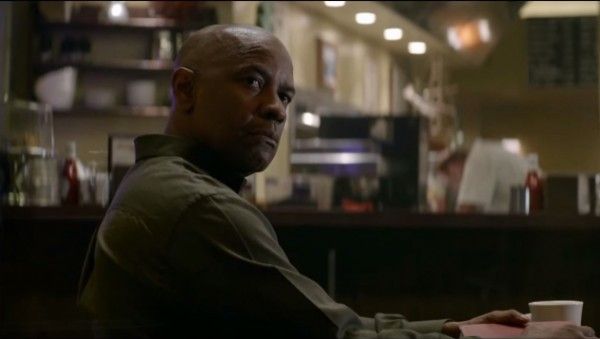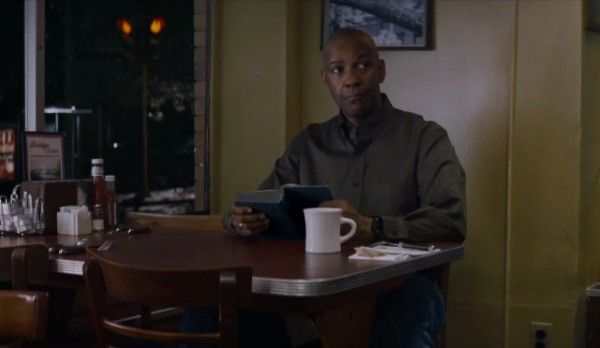Last August, when director Antoine Fuqua was filming The Equalizer outside of Boston, I got to visit the set along with a few other reporters. Adapted from the 1980s TV series of the same name, the pic reteams Denzel Washington with his Training Day director as he plays a former black ops commando who comes out of his self-imposed retirement to rescue a young girl (Chloe Grace Moretz). Soon thereafter, things go south and he finds himself squaring off against violent Russian gangsters. The film also stars Melissa Leo, Martin Csokas, Haley Bennett, David Harbour, and Bill Pullman. I learned a lot about the movie on the set visit and walked away thinking the film could turn out great, especially with Washington playing an ass-kicking hero defending folks that need help. When Sony test screened the movie, the pic scored huge numbers and they’re already prepping a sequel, which doesn’t surprise me at all.
During a group interview on set with producer Todd Black he talked about tailoring the role for Denzel Washington, how they originally courted Russell Crowe to star, how the project came together at Sony, the franchise potential, the hard R-rating, how Washington plays a character with obsessive-compulsive disorder and the way it’s used in the film, changes from the TV show, casting Chloe Moretz, why they didn't go with previously attached directors Nicolas Winding Fefn and Rupert Wyatt, the action scenes, and a lot more. Hit the jump for what he had to say. The Equalizer opens in traditional theaters and IMAX on September 26th.
Question: Well, I'm definitely curious about the rating on this one. Antoine is known for doing some of violence in some of his movies and showing excessive violence, which I'm a fan of. I'm just curious where you're going for in terms of what we're going to see on screen?
BLACK: You're going to see a very hard R movie. It's called The Equalizer and it's about a guy who takes care of people who either can't or don't know how to take care of themselves because they've been done wrong by really bad people. And he takes care of those people that have such a wrong doings it done to them. And he gives the bad people a chance to rectify it at every turn, as you saw on here. And when they don't take him up on his chance he violently, violently takes care of them in a way that they will never breathe again.
We see him dealing with Chloe's situation. Is this the only situation that he deals with in the film or is there other – are we going to see other things?
BLACK: Basically there is an organization that is run by a very powerful man and he has people that work for him in Boston. He's all on the East Coast and he has a lot of people that work for him. And his organization has girls, gas money, laundered money, oil, shipping stuff; he has his fingers in lots of stuff that take place in American cities and he has a lot of people that are on his payroll. And these people recruit or force innocent people into helping them make the money for our powerful guy. And so ultimately the story is Denzel has to weed out who the people are who work for this uber villain and then ultimately get to the head of that organization to ultimately get to the uber villain.
Can you talk a little bit about Denzel's backstory?
BLACK: Yeah. That's a good question. We – it's funny, we struggled with not revealing that much in the first tale because we're hoping that if the movie works some of it's answered as you're watching it and some of it isn't answered. I think we all agreed, Denzel agreed with us and the writer that so often times in these movies as you guys know everything's spelled out so there's kind of nothing for you guys to figure out when you're watching the movie because it's all laid out there. And we thought a little bit of a mystery, that's why he talks about his wife but doesn't really answer it and just little things along the way. So you do find out a little bit about his background. There is a scene in the script that he goes and he goes to somebody that he used to work with, Melissa Leo and her husband Bill Pullman and he asked them for help in his quest to find the uber villain and his group. And you come to discover that Denzel was a very, very high up in some kind of organization. You don't really know what up to the very end, but you know he is highly skilled, probably more highly skilled than anybody in any movie you've ever seen, we hope, and knows how to kill people in a way that nobody else does. And you kind of find out that he's at the top of his game and he's trying to escape it, but it's just his natural thing that he can never escape it. So you kind of find that out progressively, and God willing if the movie works, God willing, and you guys support it, the second movie you'll find out even more. But even if there isn't a second movie you find out enough that I think it works.
So Denzel is committed to the idea of a second movie at this point?
BLACK: You know, we're all committed to do a second movie until there isn't a second movie. I mean if it works and the audiences like it and it works critically and financially, I'm sure Sony and Denzel and all of us will want to do a second movie, but you never go into these thinking that because you never know. So you do have to satisfy certain questions that are necessary to answer in case there isn't a second one, but you hope for a second one.
In that case does that change how Denzel deals with this organization? Like is this entire story going to deal with this organization or is this an organization that we can see pop up again?
BLACK: Very smart of questions here. No, this story will end if we cut it – it's funny, we can cut it two ways; I'm really letting you guys in right now. Is this okay that I'm really going there? Okay. It really depends – we can tell the tale in different ways. We can tell the tale with it being a standalone or we can tell the tale just the way it's been constructed with it maybe coming back again.
Is that's something that you determined based on test screening?
BLACK: You know, honestly two things: yes for sure test screenings, but also ourselves. We have to put the movie together; we have to look at it in November and feel it. Just as the filmmakers you sit in a room and you put it on it's feet when it's all done and you can feel if you went too far with a storyline, you can feel if the endings not satisfying, you can feel if the ending is too much information. So it isn't just the test screening, for sure that's a part of it and you for sure want to see if the audience is engaged and you ask them, you know, you can feel it even before you ask them any questions if there's a want to see. So if there is then maybe you re-cut the ending a little different to leave it a little bit more open. But we've constructed it, I think, I hope we've constructed it in a way that we can have our cake and eat it too I hope, but you don't really know until you're done. I mean there's no science in this. You do the best you can and then you have to see it on his feet before you can really answer those questions.
What are some of the other marked traits of our hero? Like he obviously has some OCD tendencies and he's very quiet and retired, what kind of differentiate him from other…?
BLACK: Well, he has OCD, which is really fascinating because in his job it worked beautifully for him, but in his life he struggles with it. And it's interesting because our prop master she - I don't know if I should be telling – she has OCD. She readily admitted it. And so when Denzel met her, she's a local here in Boston, he got a lot from her in kind of working out his props that he was going to use because so much of the movie he uses – he never use a gun in the movie so he has to use whatever is around him, the skulls that you saw on the desk, whatever is around him he will use as weapons because he is, for the moment, anti-gun, which you'll find about that also. So his OCD serves him really well in that regard. You don't understand the OCD completely until you kind of go through the story with him. You know that he's widowed. You know that he is highly, highly skilled and educated. And you know that he is a master of disguise; you find out he works at Home Depot in the daytime and he comes home and he lives alone in a very ordered apartment. He's very skilled; he's a skilled laborer. He knows how to put on – he can be whoever he needs to be in the situation that he's in. It's not that he's a master of disguise but he is very good at being able to move from city to city and become who he needs to become to do what he needs to do.
Is he like a martial artist or anything like that? Denzel is obviously very varied in his physical background.
BLACK: His abilities to take care of people are varied with different weaponry and different fighting methods. So yes he is.
So, the fact that he doesn't use a gun that breaks quite directly from the show. Are there any other big changes that you guys…
BLACK: Yeah, so the show – here's what happened. We found out that the rights were available because the rights holder Michael Sloan, who created the show, had had them set up in the Weinstein Company. And they reverted back to him at a certain point if he wanted them back and he did want them back. He had the right to do that, even though Harvey wanted to keep them. And once we found that out we jumped on them because my partner and I loved the title of what that is, even if you didn't know the show. And then there's a lot of people – I mean your guys age never knew that show. I mean I kind of knew that show pretty well and then when you get in your late 50s and 60s everyone knew that show. But the title, in my mind, was a great title, is a great, great title, particularly when you say Denzel Washington is The Equalizer, that kind of matches to me as peanut butter and jelly. So we went after the title and the concept of it was great. We weren't really so hung up on what the show was and all the machinations of what Robert McCall did or didn't do and what his backstory was. We knew that that didn't really matter because it was a whole new audience, so we just took the concept and we took the title and then we made it our own.
What about that concept to you really read as relevant to this moment?
BLACK: Well, that's a great question and to us it red as more relevant now than ever before, ever before. There's so many voiceless people that have been thrown out of their homes by the banks, water and power companies turning off stuff, just to so many people that don't know where to go to have the wrongdoings that have been done with them, and not necessarily in this violent way per say, although I'm sure a lot of people would like to do what Robert McCall does to the people that have done bad things to them. So I think there are so many voiceless today, I mean just with the financial crisis, just with Wall Street people what they've done and home mortgages and on – every night you turn on the news there is so much injustice that we are all living with around the world, not just in America, and I think we all want an equalizer on some level, we all do, we all do; every one of us want an equalizer on some level. I have a situation right now that I'm doing with with a car thing on a warranty that I pay for my kids car, every month for a tire warranty that I pay for and they've had my kids car for two weeks and I can't get anyone on the phone. I am so angry at this point and I'm in Boston and this is in L.A., and I like I want The Equalizer to go take care of this situation. And that's me. So, I think it's really relevant to answer your question. I think everyone of you have been in situations before in your lives, now or earlier, or will be later with a landlord, the credit card company, a bank, something that you wish you had somebody to go have a little muscle and say you better stop it. So I think the relevancy has always been there, but I think more now then ever.
This wasn't always Denzel Washington as The Equalizer, can you talk about how the casting and how this kind of filled out to be what it is now?
BLACK: Yeah. We originally were talking about Russell Crowe. And as we were developing the story, even before he wrote the script, it just kind of felt like I don't know that Russell Crowe is exactly right for it in the way we kept talking about it, and I really like Russell and he's a great guy and he's a great actor and he probably could have done a fantastic job at it, but the more we internally in our office were developing it with the writer, it didn't feel like Russell. And literally I had a lunch scheduled with Denzel I think like the next day and I said to the writer and to my partner it really is Denzel. It's more Denzel than anybody. And like there was light bulb moments. And so I sat with him at lunch I just said, you know, Denzel and I had been looking for a franchise. He's a friend of mine that I worked with for a long time and I said, "I think maybe I have a franchise for you that's not written it yet, but if you're interested I'd like to have the writer write it for you." And he said, "what is it?" And I said, "Have you ever heard of The Equalizer?" And he goes, "I never saw it but it was a show right? It was about a guy…" and he explained what it was. And I said, "yeah." And he goes, "that's a great idea. Make the script great and I'll come in."
So we literally for eight months worked on a script with the writer and just tailor made it for him. And then once that happened and we gave it to him on June 30, he called me on July 3 of last year at 2:30 in the afternoon, and we were off because it was July 4 weekend; it was on a Tuesday. And I said, "hey." I said, "How are you?" And he goes, "I'm Robert McCall. How are you?" So he was in. So then I was going over to Amy Pascal's house, the chairman of Sony the next day for a Fourth of July party and I brought the script. They had nothing to do with it because we had developed it internally in our company, but our deal is at Sony. So I brought the script and I wrapped it up and I said, "Happy Fourth of July." And she said, "What is it?" And I said, "It's your next movie starring Denzel Washington." She read it that night. She had her staff read it that night and July 5 we were green lit. And then the cast came together – it all came together very quickly.
I think when you say Denzel's attached it was a little easier. They're like sold. Just because…
BLACK: But I will say the scripts really good. If the script sucked Amy Pascal's not going to green light it, but the script was really tight. It was a really tight very well written script that Richard just nailed, after lots of rewrites.
Sure. And I had read about how Russell Crowe was originally talked about for it. I was wondering if race at all played into why you chose Denzel as your lead? I mean Denzel sells himself.
BLACK: I couldn't give a shit. I don't care if he was green, yellow, black or white, it's just you want the right actor for the role. I don't think about black or white. We all have red blood so it didn't matter to me. He's just a great actor for the role.
So, this is obviously kind of a refreshed version of The Equalizer, will there still be things for fans of the TV show?
BLACK: I think a couple things. But really we just took the concept. I don't want to put it out there that we're going to satisfy fans of The Equalizer. I don't think we're not going to fast satisfy them, but we really made it our own and we really stayed true to the concept, but the show is the show. We are not saying that it's anything more then that.
Because like you were saying it's the younger people who have like no familiar.
BLACK: Yeah. I mean I think the title is such a strong title and I think when you say Denzel Washington is that guy, that raises the bar and I'm sure there's going to be people that are you don't have him driving the Jaguar or why did you do this? But that is just what it is, but we made it our own. That was a long time ago and it wasn't the most popular show on television. We didn't feel like we had this hard-core responsibility to satisfy those 100,000 fans. We wanted to make it something really great and different and the concept we honor.
Going back to casting, the Chloe Moretz role was initially said to be a 20 something role but you just said that she would be playing 16. How did that develop?
BLACK: We had wanted her to be young. We had not written it as that young and Amy Pascal, to her full credit, called myself and my partner and Antoine Fuqua and said, "There's an actress that you guys know just from Kick-Ass but we know her from Carrie and we're getting to be in a relationship with her. Would you guys meet with her and bring her in and read her with Denzel?" We said, "Yeah, of course." She rarely makes those calls and she has great taste. I think she's got great taste and I think when she stands behind something we would be foolish not to pay attention to it, not because she's the green light button pusher but she was really passionate about it and I trust her taste.
So we called Chloe in. Well, we sent her the script; she loved it. She came in. Denzel read with her. We watched the tape and it blew us all away. It was like fantastic. And you didn't feel – you felt like she was 16 going on 25 but still 16 so you felt the innocence there, but you felt her putting on the kind of the bravado of a 25-year-old who has to do this even though she's very innocent. So we did a little tweaking on the script to accommodate that and I email Amy every day thanking her for turning us onto her. She didn't insist that we do it, she just asked us to see her for it. And her instinct was 100 percent right.
Is she around throughout the movie?
BLACK: She is in five key scenes and they're really key scenes. There's two more diner scenes that you didn't see, there's the first one where he sees her for the first time, this was the second one and then there's a third one. And then there's two more scenes after that with her.
That diner seen that we saw is relatively meaty and a dialog scene within the context of what you might think of as an action movie. Is that characteristic of the movie?
BLACK: Yes. Great observation. You guys are very smart, seriously. What I love about the script and what I'm loving about the movie is there's a real balance and we intentionally did this, intentionally, and Denzel has a huge hand in this with us. It is a character piece. It is emotional. It is dramatic and the action is a part of it. It is not an action movie; it is a character movie with the phenomenal action and intense action, like really intense action. I mean really like it rips your heart out action. Because you know Antoine, I mean he goes for it. But, because it's Denzel, and some other very good actors in the movie, I mean Melissa Leo has a scene that is so good, the drama of it also, the emotion of it if you will. I mean there's a scene with a bad guy and Denzel sitting at a Russian club, the club that's downstairs from this office that you saw that our brilliant production designer Naomi Shohan design of Denzel sitting at a table with Teddy, our bad guy, and he confronts him. Denzel walks into the restaurant, he sits down and he goes, "I know you are and I know your story." And for about five minutes he tells Teddy his entire life story. And he says, "And you better stop. And when you're ready to stop here's my number." And Denzel writes his number out and gives it to Teddy and he goes, "because if you don't stop I'll stop you." And you just watch this five minutes very quiet exchange, it's almost like the scene in the Heat between Pacino and De Niro where it's just quiet, it's that kind of vibe.
So you have that interspersed with great action throughout, I mean really intense action. And they both pretty much hold equal weight. And I think it works better for audiences that way because it grounds you more, rather than just silly blowing up or boring drama. We don't have either of those now so we're really careful to design it in a way that you get involved in the characters emotionally so that you want them to get whatever they deserve or you want Denzel to do what he does to them. Because if you're not feeling it emotionally then it's just random action that you've seen a million times and it doesn't matter. So we really wanted to raise the bar a lot.
Can you tell us about the path that led to bringing Antoine into helm? Because you guys also talked to Nicolas Winding Fefn and Rupert Wyatt, just from what we've heard.
BLACK: Yeah, those were the only two we talked to. There were a lot of directors that wanted to do it. We did talk to Nick. Nick wanted to make a very different movie than we wanted to make. I like Drive. We all like Drive. We thought it was pretty cool. We were concerned that there wasn't going to be the heart to this man and the soul because Robert McCall has a lot of heart and soul. You can get it in the Chloe scene, and he throughout the movie, I mean he's a very emotional man and he's very – he's emotional. He spiritual and he's emotional and we were afraid after spending some time with Nic that Nic didn't see that, or maybe he saw it but he didn't want to make that more of a centerpiece than we did. So we moved off of Nic and then we talked - Rupert read it and Rupert wanted to do it but he wanted to make a different movie than we wanted to make. And we very nicely parted ways and we really like Rupert and we're looking to do another movie with Rupert. I think he's a really talented guy and Denzel loved him also. So we'll do something else with Rupert for sure and I would like it to be with Denzel, he just wasn't quite right for this.
And Denzel actually was the one to say have you guys talked to Antoine. I had a great experience with him on Training Day. And we hadn't seen Olympus Has Fallen or any of that yet so Antoine was posting Olympus Has Fallen and he had read the script and he loved the script, and obviously he loves Denzel and it had been many years that they had worked together. And he came in and he sat with us quietly and he just everything he said was what we wanted. And he felt the most right and Denzel obviously felt very comfortable with him. I mean he won the Academy award with him. So that came together very organically and very naturally and the studio was super happy and that was that.
Do you guys have a thought – I mean you did bring these two together and they did win an Oscar before and you're talking about this is not so much an action movie, like is the Academy Awards something that you're thinking you might have a shot at?
BLACK: I have no idea. I mean when I say it's not so much in action movie, there is a lot of action in it and it's a lot of close one-on-one hard-core action. But we didn't want to just make it an action movie; we wanted to add other things to it, so just to clarify that. As far as the Oscar thing I can never think about that. I mean as a producer you will kill yourself if you're trying to make movies to win Oscars. I mean I'm just trying to make movies that are real and that I like and that I think my 20-year-old or my 16-year-old will like and that you will like. I just can't think about – I mean would I love every one of my movies to get Oscar nominations. I would love it but I can't even think about that anymore. I can't think of anything but making them the best I can make them and really making it work.
I just wanted to ask you how did you pick a nemesis for Denzel who is playing his…?
BLACK: That's a great question. A lot of auditions. A lot of auditions. I mean we saw a lot of people. It's a great bad guy role and we were very - funnily enough Denzel at one point read the rewrite and he goes, "Maybe I should play the bad guy. It's a really good role." So we had a really good bad guy and we all believe that the bad guy has to be as good as the good guy because then it's a little boring, it's imbalanced. So Richard Wenk our writer, really wrote a fantastic bad guy. So we auditioned a lot of people and a lot of people wanted to do it. I mean anybody – like big names and then we found Marton and he came in and he just – his audition was spectacular. He was spectacular. And then we had him read with Denzel and Denzel called us and basically said that's the guy. I mean we were unanimous. There was no – the studio loved him, Antoine loved him, we loved him, Denzel loved him. It was very easy. I mean he just won the role by talent.
Similarly, how do you kind of decide on this one seems to be like there's a Russian syndicate, how do you decide on who the bad guy forces are in this? Why somebody who's foreign versus domestic?
BLACK: The writer wrote that originally and it just kind of worked. I mean we didn't really think about – I mean there are Americans and there are local Boston people that work for the bad guys so it's not just - the head guy is Russian, but a lot of the bad guys are from Boston or New York or wherever. It's a whole crime syndicate and so there's many different ethnic people that are a part of it, white, Russian, whatever, whatever. That was just what was written and it worked. So there was no need to – we weren't thinking maybe we should make them Middle Eastern or maybe we should make them Argentinean, I don't know it just worked that way. No one put a lot of thought onto that. And it has nothing to do with Russian politics at all, just he happened to be Russian.
With all the tax incentives that are around, how tough was it to actually get Boston to play Boston?
BLACK: It was a pleasure that we could say we were using Boston for Boston. It was the greatest thing ever. We didn't have to change anything. The Boston Film Commission loved it.
Did you guys get any sort of tax breaks filming here?
BLACK: Oh yeah, we have three movies sitting here right now and there has been a lot of other studios that are coming here because Boston offers – there are three states right now that offer above the line and below the line tax rebates. Which means your actors, your director, your producers, your writer, those are all called above the line. That's rebatable also, so unfortunately we couldn't have made the movie in any other place but these three New Orleans, Atlanta and Boston in these three cities because everywhere else you don't get your above the line rebates. You get rebates like in New York but you don't get above the line rebates. So we saved so many millions of dollars by shooting here. We would have loved to have shot in New York. We written for New York and we change it for Boston and had no impact on the story at all so we were very lucky. And it's been great; I mean it's great shooting here. And it's great being able to call the place you're shooting in the place and not have to disguise it.
You had like mentioned before that there's like a lot of - obviously you could have gone a lot of ways with this. You didn't have to be helping a prostitute. Was that a conscious decision or that's just how it was written and that was a compelling story so you went with that?
BLACK: The writer wrote that originally like that and it felt right. I mean she was helpless in that she couldn't get out of the organization. They wouldn't let her out. Like so many of these prostitution organizations, we did a lot of homework and Chloe did a lot of homework. I mean Chloe went to Children of the Night in L.A. or different places and a lot of these girls and guys are in prostitution rings that they get hurt if they try to get out. So he knew that; his character knew that and we didn't change that. That was in the script.

